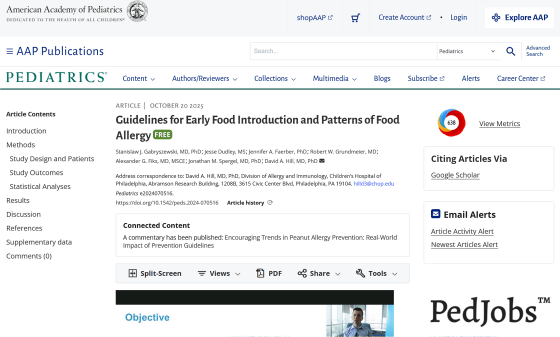It turns out that tens of thousands of children could avoid peanut allergies by advising that 'infants should also eat peanut products'

In 2015, the United States issued guidelines recommending that children be given peanut products from infancy to prevent peanut allergies. As a result, a newly published paper shows that the incidence of peanut allergies among children in the United States has decreased significantly.
Guidelines for Early Food Introduction and Patterns of Food Allergy | Pediatrics | American Academy of Pediatrics

Reversing peanut advice prevented tens of thousands of allergy cases, researchers say : NPR
https://www.npr.org/2025/10/21/nx-s1-5580211/peanut-allergy-study
Some 60,000 kids have avoided peanut allergies due to landmark 2015 advice, study finds - CBS News
https://www.cbsnews.com/news/peanut-allergies-60000-kids-avoided-2015-advice/
Peanut allergies occur when the body's immune system mistakenly identifies proteins in peanuts as harmful and secretes chemicals that cause allergic symptoms such as hives, respiratory symptoms, and anaphylactic shock. For many years, doctors have issued guidelines recommending that children should wait until they are three years old before introducing peanuts or other potentially allergenic foods to their children.
However, in 2015, research results were published that overturned previous beliefs, showing that consuming peanuts during infancy can prevent peanut allergies. In a clinical trial conducted by researchers on infants, it was shown that giving peanut products during infancy reduced the risk of developing peanut allergies in the future by more than 80%.

The hypothesis that peanut consumption from infancy may reduce the risk of developing a peanut allergy originated from the question, 'Why is the incidence of peanut allergy in Jewish children living in the UK ten times higher than in Israeli children of similar ancestry?'
At the time, there were guidelines regarding peanut allergies in the UK and the US, so few parents fed their babies peanut-containing foods in the first year of life. However, in Israel, a snack called '
Following the results of a 2015 study, the US guidelines were revised to recommend introducing peanuts to infants from around four months of age. Information has continued to be updated since then, and expanded guidelines were issued in 2017 to include food allergy testing.

A research team led by Dr. David Hill of the Children's Hospital of Philadelphia analyzed electronic medical records from pediatric clinics across several states in the United States to examine how food allergy diagnoses changed before and after the guidelines were issued.
The results confirmed that peanut allergies in children aged 0 to 3 have decreased by more than 27% since the guidelines were first issued in 2015, and by 43% since the expanded guidelines were issued in 2017. According to Hill, the change in guidelines is estimated to have prevented at least 40,000 children from developing peanut allergies over the past decade.
'What we can say is that fewer children are developing food allergies than would have happened if the public health measure of feeding infants peanut products had not been implemented,' said Hill. 'Our findings are relevant not only to those of us who treat patients, but also to those who care for infants. With increased awareness, education, and advocacy, we can further strengthen the positive results observed in this study.'

'This study reinforces what we already know and highlights a significant opportunity to reduce the incidence and prevalence of peanut allergies nationwide,' said Son Poblete, CEO of Food Allergy Research & Education (FARE) , a nonprofit food allergy organization.
To prevent allergies in children, Poblete advises, 'You don't need to feed them a lot of foods. Just introduce small amounts of peanut butter, milk-based yogurt, soy-based yogurt, or nut butter. These are great ways to safely expose your child's immune system to allergenic foods.'
Related Posts:







